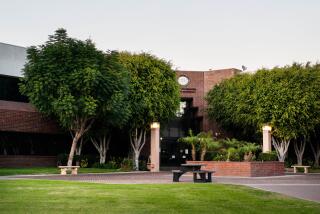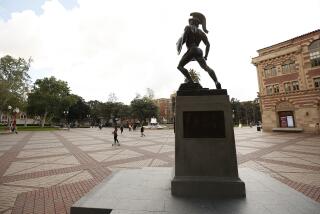Grant Will Help Students Set Their Sights on Science
- Share via
A three-part program to improve science education among San Diego high school and college students--especially women and minorities--will begin later this year at UC San Diego with $1.2 million granted Wednesday by the Howard Hughes Medical Institute.
The five-year project will include a high school science enrichment program, tutorial support for UCSD freshman and sophomores in their science classes, and research opportunities for junior and seniors.
The grant was part of $61 million that the Bethesda, Md., foundation announced Wednesday for 51 universities nationwide. The funding is intended to increase the number of students pursuing both research and teaching careers in chemistry, physics, mathematics and the medical and biological sciences. The foundation was established by the late billionaire eccentric Howard Hughes, who amassed fortunes in the aerospace and movie industries.
Risk of Falling Behind
Many national studies during the past several years have warned that too few American students, in particular blacks and Latinos, are considering science careers, whether in the laboratory or the classroom. Without more science majors, the nation risks falling behind in the number fundamental scientific discoveries and related applications pioneered in the United States, the reports conclude.
The high school component will involve students at Lincoln High and at the private Elementary Institute of Science enrichment academy, both in Southeast San Diego. Professors from UCSD will participate with about 50 high school students each year in the enrichment program that will include a summer science camp, tutorial assistance in math and science classes and help in developing science fair projects.
The secondary school component fits in with other efforts under way or planned both by UCSD and San Diego State University for boosting science and math preparation for college-bound students. The two institutions have jointly applied for a National Science Foundation grant to help students both in high school and in community college improve their knowledge and interest in science.
The component for freshmen and sophomores is intended to stem the considerable attrition among those students from science courses during their first two years in college. About 150 students will be matched with supportive faculty, who will help in tutoring, seminars and laboratory apprenticeships.
During their junior and senior years, the students will be given opportunities for summer research projects, working alongside faculty or scientists in nearby private industries. The students will then develop the summer work into honor theses.
More to Read
Sign up for Essential California
The most important California stories and recommendations in your inbox every morning.
You may occasionally receive promotional content from the Los Angeles Times.













